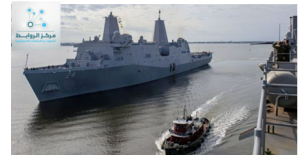Dr… Salim Mohammed Al-Zanoun.
In less than a month, four attacks on oil interests in the Arabian Gulf were targeted. In mid-May, four oil tankers were targeted off the coast of the UAE, coinciding with an attack on two oil pumping stations in Saudi Arabia and to launch a rocket that landed near the US Embassy in Baghdad, Yesterday, the Houthis targeted the Abha airport in Saudi Arabia with a cruise missile. This morning, an oil tanker was targeted in the Gulf of Oman, most likely by pro-Iranian militias.
This indicates that Iran has changed the rules of the game. The severity of the American sanctions that are crushing the Iranian economy is pushing Tehran to work and pressure to force Washington to retreat without igniting the war and entering a military battle that results in zero for it.
The essence of the change is based on the transition from a waiting strategy to a gradual escalation strategy.
First: the waiting strategy.
Since the beginning of the tension between Washington and Tehran, and even after the oil sanctions entered into full force, Tehran preferred the strategy of waiting, reducing sanctions and absorbing shocks, until the expiration of Trump’s mandate, and the advent of a new administration in the 2020 elections that it will be more flexible, and till the time of elections. Tehran bet on the Europe for assistance and the continuity of the oil exemptions for a group of countries and allow it to continue to buy Iranian oil, but failed to bet on both elements, and the Iranian economy entered the stage of collapse, at a time when the legitimacy of the regime is declining internally, with the spread of mass protests.
Second: the gradual escalation strategy.
The cost of Iran’s losses has become so large that it no longer tolerates the continuation of work according to the strategy of waiting, which will force it to change its course by moving on to the strategy of slow escalation in order to push Washington to ease the sanctions by targeting its allies .This strategy is based on three phases where it moves among them gradually :
Phase I: the threat of return to reactivate the nuclear program and accelerate the pace of enrichment.
Phase II : Using its arms deployed in the Middle East to launch asymmetric attacks that it is difficult to attribute directly to it as a state, targeting Washington’s allies, specifically oil interests, to create a shock in the global spot market.
Phase III, if there is no breakthrough with Washington, it will launch attacks targeting US interests in the region (staff, military bases, embassies).
Tehran’s start to work on a gradual escalation strategy means that Washington’s deterrent strategy over the past months is no longer feasible. In this context, Washington is likely to take new measures, other than economic sanctions, designed to contain escalation and avoid war:
1. Electronic attacks, targeting the vital interests of Iran, military and civilian.
2. Secret operations targeting the Revolutionary Guard and carrying out limited air and missile strikes on its military assets.
3. To carry out operations aimed at Iran’s active arms and likely to act to carry out attacks.
4. A limited siege aimed at pressuring Iran’s soft power elements, consisting of 4 main elements, all operating in the framework of soft war : the first is the radio of the Islamic Republic of Iran, which is spread throughout the world, the second is the Organization of Islamic Culture and Relations of Iran ,which it owns 72 official branches around the world , and hundred of unofficial branches , third Mustafa International University as a soft war arm and has 60 branches worldwide, the fourth international charities that are spread globally .
This type of attack is not expected to lead to a large-scale war, for two reasons:
First, the historical experience shows that Israel has repeatedly hit Iran in Syria without leading to war.
Second, the Iranian regime has no interest in entering into a war with Washington in light of the imbalance of power.
Rawabet Center for Research and Strategic Studies

